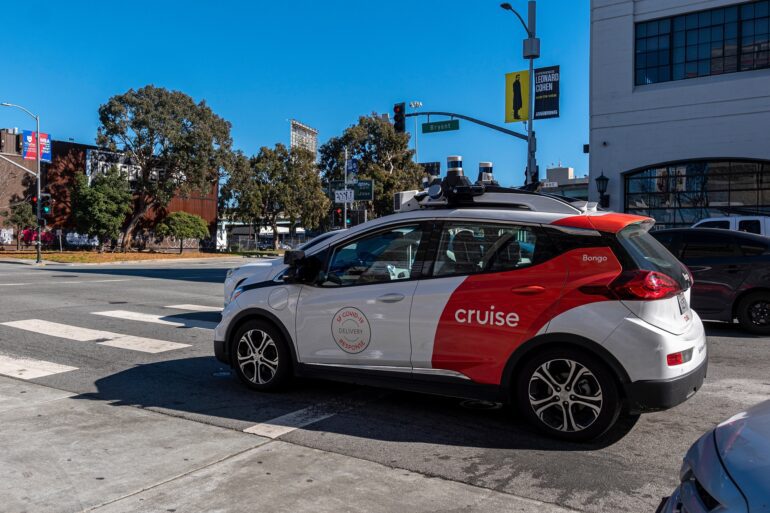TL;DR:
- California’s state board to vote on allowing Waymo and Cruise to launch a massive expansion of self-driving taxis in San Francisco.
- The decision holds significance beyond local politics, serving as a referendum on AI-related issues.
- Lobbying efforts by tech executives, labor unions, transit advocates, and others intensify ahead of the vote.
- Cruise and Waymo seek approval to operate 24/7, potentially transforming San Francisco’s streets and showcasing AI capabilities.
- Financial pressure on both companies as they grapple with significant losses and industry dynamics.
- A parallel threat for autonomous big-rig trucks also looms.
- Tech community is divided over the impact on the city’s AI technology status.
- Advocates tout safety benefits, while critics raise concerns over the technology’s reliability and impact on public transit.
- Outcome to have far-reaching implications for AI’s future nationwide.
Main AI News:
A game-changing decision lies ahead as California’s state board prepares to vote on August 10th, determining whether tech giants Waymo and Cruise will be given the green light to unleash a fleet of driverless taxis in San Francisco. But the implications of this scheduled vote extend far beyond local politics, evolving into a referendum on the broader landscape of technology. Issues concerning artificial intelligence’s politics and the profound impact on the human workforce amid the rapid advancement of AI will be decided upon.
Should the California Public Utilities Commission (CPUC) give its approval, a potential flood of self-driving taxis could soon be readily available to the public 24/7. The stakes have never been higher as tech executives, labor unions, transit advocates, city officials, and robotaxi customers wage a last-minute lobbying battle, attempting to influence the commission’s five appointed members. What unfolds in California could set the tone for a state-by-state showdown over the future of self-driving cars and trucks.
“This is going to be the only chance for CPUC to get this right,” said Mike Di Bene, a local truck driver and member of the Teamsters, one of the unions urging the state to exercise caution with self-driving vehicles, encompassing both taxis and big-rig trucks.
Beyond local politics, the clash over self-driving taxis embodies the profound questions arising in the AI domain, addressing the speed of change and the impact on workers whose jobs are displaced by automation. Cruise and Waymo, with years of pilot programs in multiple cities, are poised for transformative shifts if the commission rules in their favor. Cruise, backed by General Motors, seeks to expand its late-night taxi service in San Francisco, while Waymo, part of the Google parent company, aims to launch its paid service for passengers in the city. Both companies want to operate round-the-clock, marking a significant change in San Francisco’s streetscape while showcasing the capabilities and limitations of AI.
However, the financial pressure looms large. Cruise reported a staggering $611 million loss in the second quarter of this year, averaging nearly $7 million each day, as indicated in GM’s earnings report. On the other hand, Alphabet, Waymo’s parent company, remains tight-lipped about Waymo division’s finances but has recently downsized its self-driving trucking project to prioritize autonomous passenger cars.
The implications extend beyond taxis, as autonomous big-rig trucks face a parallel challenge. A bill in the California Legislature could mandate a safety driver to be present in an autonomous big rig at all times. San Francisco Mayor London Breed has endorsed the bill at a Teamsters rally.
The repercussions of next week’s vote are felt not only by tech companies but also by the tech community at large. Should Waymo and Cruise face defeat, concerns mount that they may consider leaving San Francisco or scaling back operations, potentially impacting the city’s position as a pioneering AI technology hub. Robotaxis stand as a tangible example of AI’s real-world application, sharing similarities with the viral chatbot ChatGPT.
Amid the heated debate, opinions are divided among proponents and critics of robotaxis. Advocates emphasize safety benefits and ease of transportation, particularly for disabled individuals, while opponents argue that the technology remains unproven and prone to errors, causing disruption to city buses and emergency vehicles.
The impending vote has sparked fervent campaigning from both sides. Waymo, Cruise, and their allies have placed ads in newspapers and social media, mobilizing support and establishing advocacy groups like “Safer Roads for All” to rally behind the cause of robotaxis. Simultaneously, critics are voicing concerns through letters to the state utilities commission, in-person rallies, and social media campaigns highlighting robotaxi mishaps.
Lorena Gonzalez Fletcher, executive secretary-treasurer of the California Labor Federation, believes the state should exercise caution, urging a thorough examination of safety concerns before allowing these companies to expand unchecked. She argues that jobs, including those in parcel delivery, are at stake and that further consideration is needed before embracing the technology without reservation.
The debate is a critical crossroads in the ever-evolving landscape of AI and its integration into everyday life. The outcome will significantly influence the trajectory of AI and self-driving technology, making it a defining moment for California’s commitment to innovation and progress. Regardless of the verdict, it is clear that the ramifications will extend far beyond San Francisco, affecting the future of AI nationwide and beyond.
Conclusion:
The upcoming vote on self-driving taxis in California marks a pivotal moment in the development of AI and autonomous technology. The decision will set a precedent for future AI-related regulations and investments, with potential ramifications for the entire market. Tech companies, labor unions, and advocacy groups are fiercely lobbying for their respective positions, highlighting the importance of this vote. Regardless of the outcome, it will shape the landscape of self-driving technology and AI adoption, impacting various industries and influencing future innovation and investments in the market.

